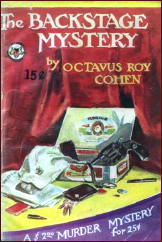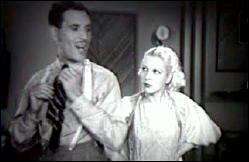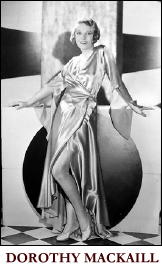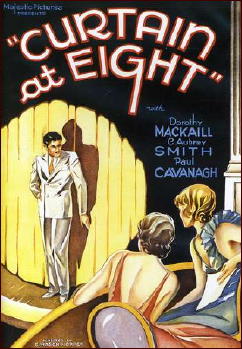Sun 16 Feb 2014
Reviewed by Dan Stumpf: CURTAIN AT EIGHT (1933).
Posted by Steve under Mystery movies , Reviews[9] Comments

CURTAIN AT EIGHT. Majestic, 1933. C. Aubrey Smith, Dorothy Mackaill, Paul Cavanagh, Sam Hardy, Russel Hopton, Natalie Moorhead and Ruthelma Stevens. Written by Edward T. Lowe Jr. Based on the novel The Backstage Mystery by Octavus Roy Cohen. Directed by E. Mason Hopper.
I’m not going to recommend Curtain at Eight because as a movie it’s mostly beneath contempt. Poor direction, a perfunctory screenplay that fails to keep track of the characters (when the killer was unmasked at the end, I wasn’t even sure I’d seen him/her before!) and entirely too much time wasted on the supposedly funny antics of a monkey.
All the ingredients of a real time-waster, and yet … by the time I finished Curtain I found myself completely charmed by it.
The cast mostly tries to punch through the desperate production values common to the sub-B studios of the time: shabby sets, ragged editing and continuity errors bad enough to cause whiplash, but they give it a game try, and director Hopper managed some effects that caught me off guard.
Paul Cavanagh, the perennial Nowhere Man of the Cinemah, puts in a neat turn as an Absolute Bounder, a matinee idol who cheats, steals, seduces and ruins everyone he meets with the exception of his part-time wife, played by that energetic vamp of the early talkies, Natalie Moorhead, who had basically the same part in Shadow of the Law.

There’s a dandy scene in a hotel room where Cavanagh is talking on the phone to his latest fiancée, and Moorhead, who has obviously spent the night with him, stifles a sarcastic laugh when he says he had trouble sleeping.
Cavanagh spends the first half of the film this way while various other characters wander in and out of the plot, often looking a bit dazed and confused as to their reason for being there. We get the boozy reporter (Russell Hopton) the star-struck innocent, deftly played by Ruthelma Stevens (an intriguing actress who deserved better — catch her in The Circus Queen Murders if you can) her worried father and jilted boyfriend, sundry Theatre types, and (alas!) the Monkey, whose antics provoke tedium that would have maddened Sisyphus.

By the time someone finally got around to getting murdered (in a neatly done if predictable moment.) I was torn between watching more of this or just taking my own life as an easier alternative. Then Sam Hardy came on as a pompous police detective, and things livened up. His bravura playing of a stock part perked things up considerably, particularly when he paused in his strutting across the screen to toss a comment at another cop sitting unnoticed in the background, and it turned out to be C. Aubrey Smith!
Smith, the unofficial head of the Hollywood Raj in those days, and a regular in much better films, is simply marvelous here. Surprisingly shabby and soft-spoken, he ambles pleasantly about the scenery Hardy is chewing at, picking up a clue here, posing a pertinent question there, making his quiet deductions and bringing things to a close with considerable charm. I don’t know what burst of desperate genius led to his presence here in such a well-realized part, but it turned Curtain at Eight into something truly enjoyable.
I should note in passing that in his day, the guy who wrote this thing was something of a pulp wunderkind; Edward T. Lowe had a hand in the Charlie Chan series at Fox, the Bulldog Drummond films at Paramount, and delirious efforts elsewhere like Sherlock Holmes and the Secret Weapon, Tarzan’s Desert Mystery and House of Dracula. Clearly a hack of distinction.

February 18th, 2014 at 4:29 am
This is an interesting review, of a book and movie of which I’ve never heard. Thanks!
Octavus Roy Cohen wrote some good crime fiction. His early novel Six Seconds of Darkness (1918) and some of the short stories in Jim Hanvey, Detective are outstanding.
February 18th, 2014 at 4:25 pm
Mike, Jim Hanvey is the character played by C.Aubrey Smith in the movie.
February 18th, 2014 at 6:05 pm
Dan,
That is very interesting!
I’m trying to imagine the “Average guy American” Jim Hanvey played by the aristocratic Britisher C.Aubrey Smith. On the other hand, both Hanvey and Smith are intelligent, articulate, knowledgeable about The World, determined, and good at solving people’s problems and setting things straight. So Smith probably does a good job!
Jim Hanvey was popular in The Saturday Evening Post. Ellery Queen liked him.
So does my sister: she thinks he’s a good character.
February 19th, 2014 at 5:04 am
Mike, Smith’s performance here is unlike any of his others. His usual stateliness and authority are replaced by a self-effacing and leisurely mein quite unlike him. Dare I say he was acting?
Anyway, I still don’t recommend the film, much as I liked it, and if you can’t find a copy for a buck or two and really want to see it, let me know & I’ll lend you mine.
February 19th, 2014 at 12:58 pm
I haven’t watched it yet, but the YouTube video I linked to is only few minutes shorter than the running time listed on IMDb.
February 19th, 2014 at 10:44 pm
I’ll watch anything with Smith in it, and have.
But Jim Hanvey? That is odd casting.
February 20th, 2014 at 2:23 pm
I really like the David Danning series, even though I don’t know how to play bridge.
February 21st, 2014 at 2:05 pm
Re Jim Hanvey
A few years later, 1937 at Republic, the right actor, Guy Kibbee, got the part.
February 27th, 2014 at 5:46 pm
Barry
I agree, Kibbee was ideal casting for the part.
Cohen isn’t that well remembered today, but was a major writer in the field in his day. Anyone wanting to sample his work without investing any money can find some of his work at various free e-book download sites. He has a small presence in the early paperback era, but disappeared fairly quickly.